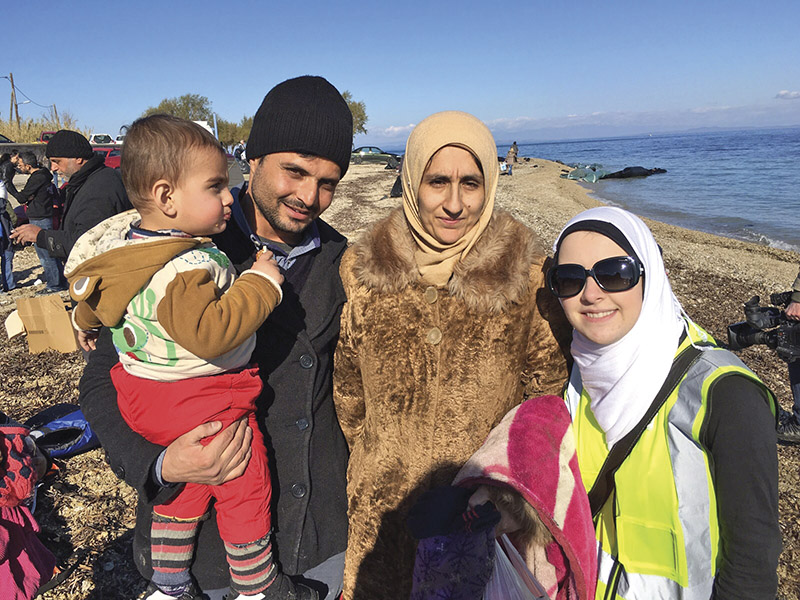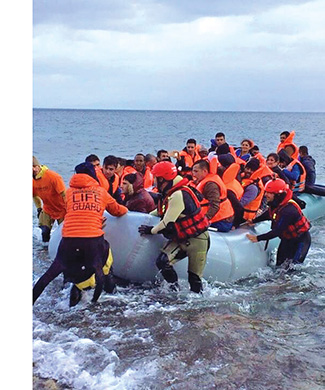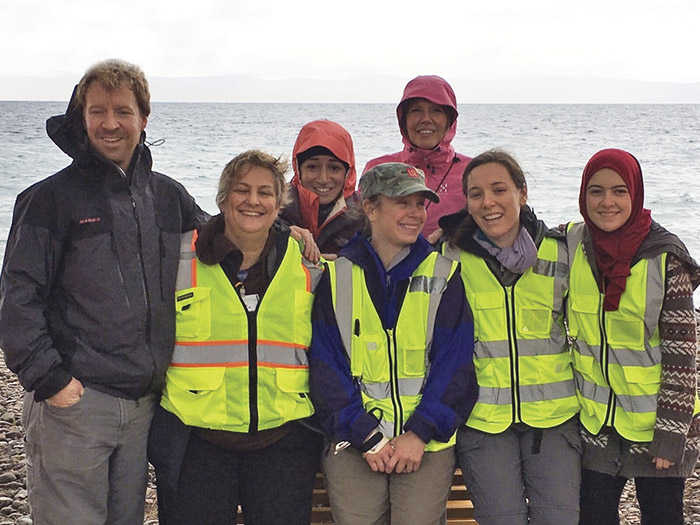| Vermonters Help Syrian Refugees on Lesbos | ||
| by Elayne Clift | ||
Ruba Orfali, a student at St. Michael’s College, stands with refugee families after a boat arrival on the island of Lesbos, Greece. |
||
Megan Frenzen, a health economist, and her physician husband, Seth, are no strangers to service work following natural and man-made disasters. They have traveled to various countries, including postearthquake Haiti, to offer medical care and other assistance when crises occur. So when the refugee crisis loomed large in Greece, Megan began researching medics working on the Greek island of Lesbos (also called Lesvos), where many refugees arrive from Turkey, to see how they could help. She located one American who had known her husband during his residency. Then she texted or called anyone she could think of who had served with her previously or who had expressed an interest in service work. One of the first to step up was Mari Cordes, a UVM Medical Center nurse who had worked with Megan in Haiti. Another was Ruba Orfali, a Syrian American student at St. Michael’s College in Burlington, who had never volunteered for service work but who wanted to help as an interpreter. It wasn’t long before nurse-practitioner Barbara Swan was on board, too. “It was my first medical mission,” Barbara says. “It felt surreal when I made the decision, but I love health care, and I wanted to feel like I was doing something to help.” It was also surreal arriving on the island at night to pick up a rental car and drive to a vacation rental home overlooking the Aegean Sea, just an eight-minute drive from the refugee camp where the team would begin work the next morning. Lesbos is, after all, a tourist island with good restaurants, beautiful beaches, and upscale guest accommodations, now oddly juxtaposed with thousands of exhausted refugees arriving cold, wet, and exhausted, day and night. “It was hard to get your head around,” Megan notes wryly. |
||
 |
||
|
Megan, Mari, Barbara, Ruba, and Seth arrived in Lesbos on a cold night when “it was raining sideways,” with 650 pounds of luggage, which included various medical and other supplies. There they were joined by two other volunteers whom Megan and Seth knew from prior service work. The seven-person team worked together for a week in January with the shared goal of making a difference and, as Mari Cordes put it, “to be part of the antidote. I wanted to show people that we represented the best part of the US. We were there to offer a heartfelt response to [anti-refugee] hate.” In researching how and where they could help, Megan identified a small nonprofit volunteer group called Better Days for Moria, which has established a transit camp for refugees arriving on Lesbos. They have set up services, including a clinic, next to the registration camp. Refugees are welcomed with dry clothes, food, and hot tea as they arrive. The organization is one of several grassroots groups working collaboratively on the island with a common goal: “To bring a sense of humanity and care to the difficult journey these people are experiencing,” according to the Better Days website. One of the most important contributions the Vermont team made was providing respite for longer-term volunteers, especially during the night. “We were impressed by the clinic’s organization and professionalism,” Megan says. “Supplies and medicines were available, much of it brought by other volunteers.” But nothing prepared them for what they saw in the camp clinic and on the beaches. “It was heartbreaking,” says Megan. “There were professional people, medical students, pregnant women, women with little kids.” Ruba remembers the shock of seeing so many refugees with injuries and illnesses. “I’d never been in a medical environment before. It was hard to see so many people with diarrhea, flu, and respiratory infections.” And Barbara recalls the first time she saw a rubber dinghy with at least 50 people on it. “Some men only had rubber tubes. They jumped out of the dinghy hooting and hollering because they felt safe.” |
photo: courtesy Mari Cordes |
|
| One night after she had done an evening shift with a pediatric resident, Mari went to the beach to see if more boats were arriving. There she met another volunteer with an organization called Because We Care, which had set up a night camp on the beach. She heard stories of boats that had made it past armed Turkish guards only to run out of fuel. Some people on board had working cell phones and attempted to alert others on shore. Others tried to abandon their boats too soon, and Greek volunteers or Danish lifeguards had to try to save people at risk of drowning. An infant, she learned, had died of hypothermia, and a pregnant woman had been crushed in the rush to land.
The next morning when Mari returned to the beach, she saw a luxury-sized ferry that travels between Turkey and Greece—and does not allow refugees on board—pass by. “It was surreal in so many ways,” she says. “I’m still processing it. It left a big imprint on my heart—all that trauma and so much gratitude [as refugees arrived], all in the same moment. It was heartbreaking to see people fall to the ground and kiss it. They’d lost everything, but they still wanted to give us gifts. Some took amulets off their necks and handed them to us. Others offered us biscuits. There was just so much humanity and kindness from people who had lost everything.”
Some people ask Megan why she and Seth do this work when they have a small son. “That’s exactly why I do it,” she says. “I want my son to grow up as a compassionate human being. I want him to appreciate his privileges and recognize it as an obligation to help the less fortunate—to see the best of humanity even in those who suffer the most serious misfortunes.” What do she, Mari, Barbara, and Ruba tell others considering similar volunteer work? “Check out organizations. Talk to others. Then just do it!” For more information about volunteering, visit www.betterdaysformoria.com or contact Megan Frenzen at megan.frenzen@gmail.com or Mari Cordes at mari.cordes@gmail.com.
|
||
|
||
| Elayne Clift writes about women, health, and social issues from Saxtons River, Vermont.
|
||


